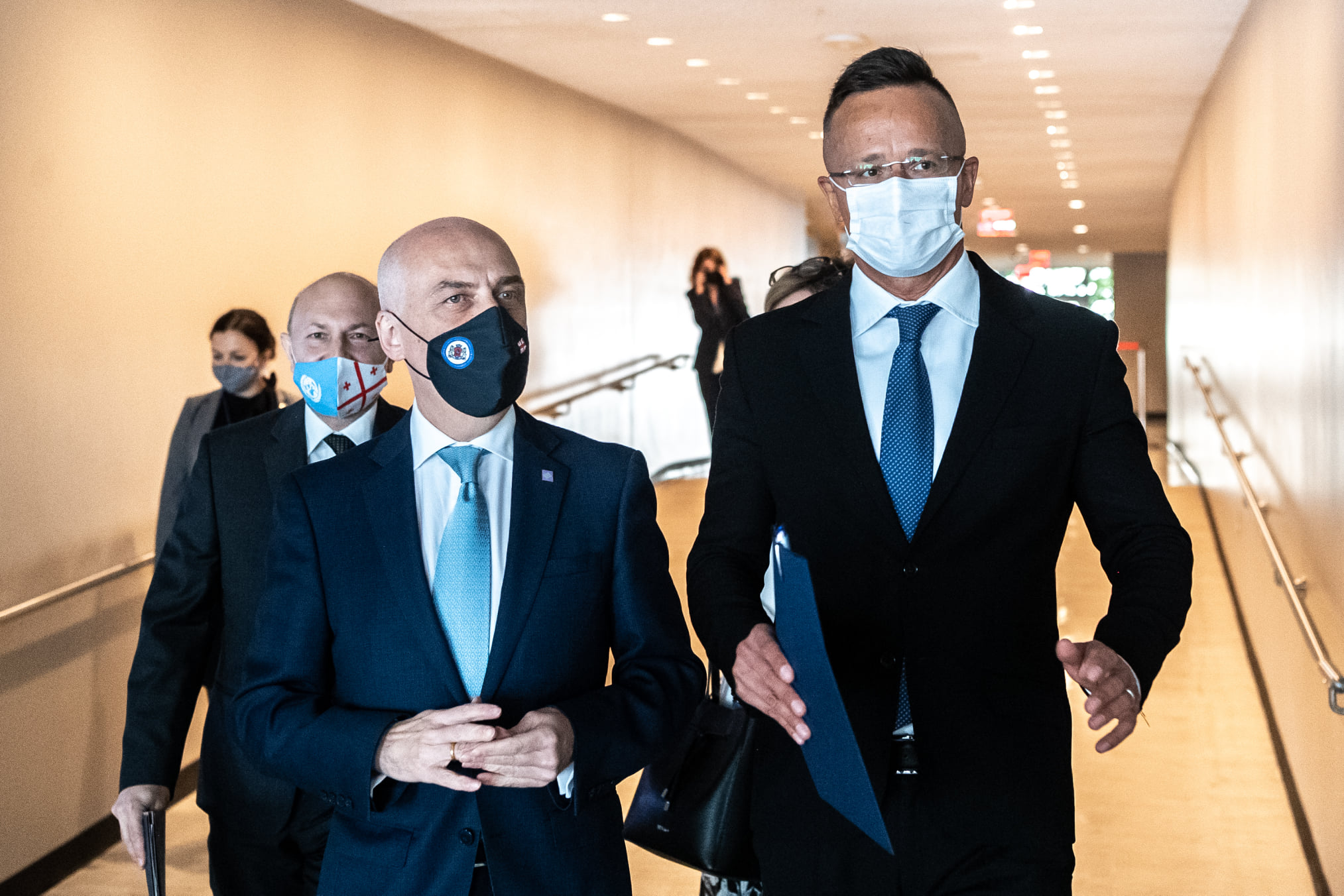Emergency Powers Extended, but Vaccines for Sale

Minister of Foreign Affairs and Trade Péter Szijjártó (at right) in the UN building on September 21. At the 76th session of the UN General Assembly in New York, the foreign minister said Hungary would sell 800,000 does of AstraZeneca vaccine to Thailand and Vietnam.
Photo from Péter Szijjártó’s Facebook page.
The Hungarian government submitted a proposal to Parliament on September 14 to extend the effect of its emergency powers to protect the country against the coronavirus pandemic until January 1, 2022, according to the website of the Government Information Center.
The government argues the extension is necessary because the pandemic is still present, and the number of infections is increasing in Hungary and across Europe due to the spread of the delta variant of the virus.
Although the number of vaccinated persons stood in Hungary as of September 22 at 5.8 million, in a country of 9.7 million, the government continues to encourage those not vaccinated to inoculate themselves against the coronavirus with any available vaccine.
Similarly, the Hungarian Rectors’ Conference (MRK) recently asked university students, lecturers, researchers, and staff to apply for vaccination against the coronavirus if they had not done so already, according to hrportal.hu.
MRK said that students and those in their age group are typically the most mobile and frequently experience personal contact. By increasing the vaccination rate among students, they can attend classes physically and minimize the spread of the virus in their familiar network.
Jabs for Under 12s
In terms of further vaccine development, Gergely Gulyás, the head of the Prime Minister’s Office, announced that Hungary would be joining the European Union’s procurement scheme for Pfizer vaccines for children under the age of 12 on September 15.
While coronavirus-related cases are increasing, the growth in infection numbers is not expected to be followed by a similar increase in hospital admissions and deaths, thanks to the high vaccination rate, Gulyás said.
In tallying current vaccine figures, Gulyás said Hungary has 3.3 million doses of Pfizer and Moderna vaccines, 1.5 million doses of the AstraZeneca jab, some 300,000 doses of Jansen, 77,000 doses of Sputnik V, and 2.6 million Sinopharm vaccines.
Indeed, Hungary is so abundant with vaccines that it is able to sell 800,000 doses of the AstraZeneca to Thailand and Vietnam, Minister of Foreign Affairs and Trade Péter Szijjártó said at the 76th session of the UN General Assembly in New York on September 21.
Both countries approached the government to enquire about buying the vaccine, and each will receive 400,000, Szijjártó said. He added that Hungary has “several million” COVID jabs in storage and can offer assistance to others.
Meanwhile, Hungary has signed a memorandum of understanding on the local production of the COVID vaccine developed by China’s Sinopharm, State Secretary Tamás Menczer said in a post on Facebook on September 19.
According to the MoU, signed by Sinopharm-CNBG VP Jiang Xiuchang and the CEO of Sinopharm-CNBG’s joint venture in the UAE Peng Xiao, the capacity and infrastructure to produce the vaccine will be set up in Hungary within 10 months, at the latest, Menczer said.
He added that partners in China and the UAE are continuously examining new mutations of the coronavirus in working to develop the most effective vaccines, which could give Hungary the chance to get the latest information on new variants and adjust local production rapidly and efficiently.
This article was first published in the Budapest Business Journal print issue of September 24, 2021.
SUPPORT THE BUDAPEST BUSINESS JOURNAL
Producing journalism that is worthy of the name is a costly business. For 27 years, the publishers, editors and reporters of the Budapest Business Journal have striven to bring you business news that works, information that you can trust, that is factual, accurate and presented without fear or favor.
Newspaper organizations across the globe have struggled to find a business model that allows them to continue to excel, without compromising their ability to perform. Most recently, some have experimented with the idea of involving their most important stakeholders, their readers.
We would like to offer that same opportunity to our readers. We would like to invite you to help us deliver the quality business journalism you require. Hit our Support the BBJ button and you can choose the how much and how often you send us your contributions.











